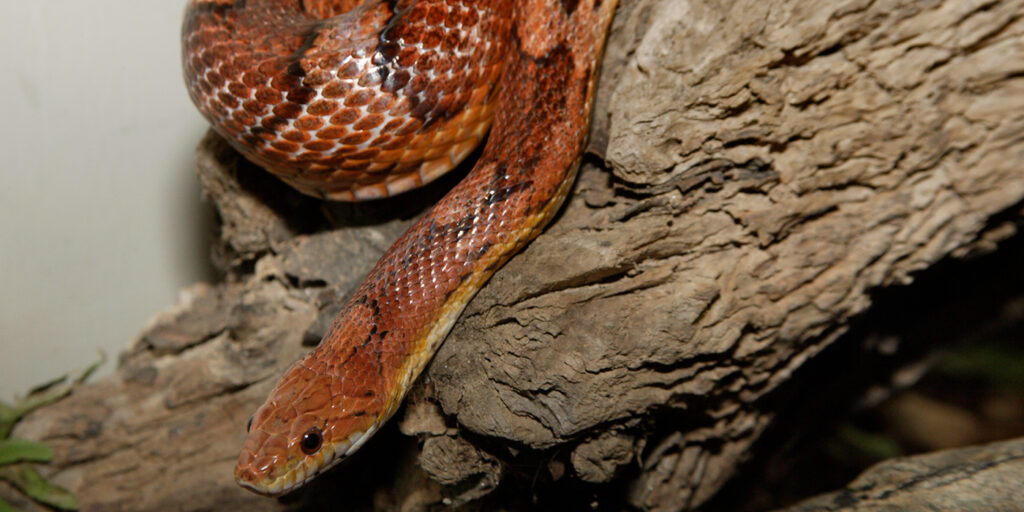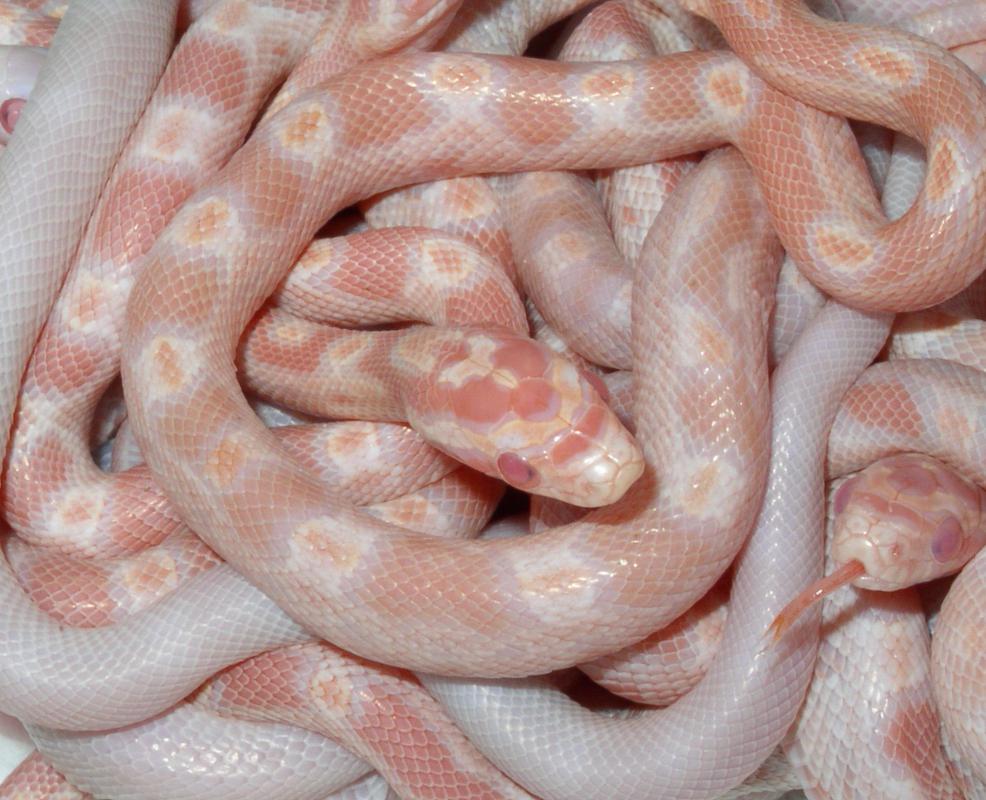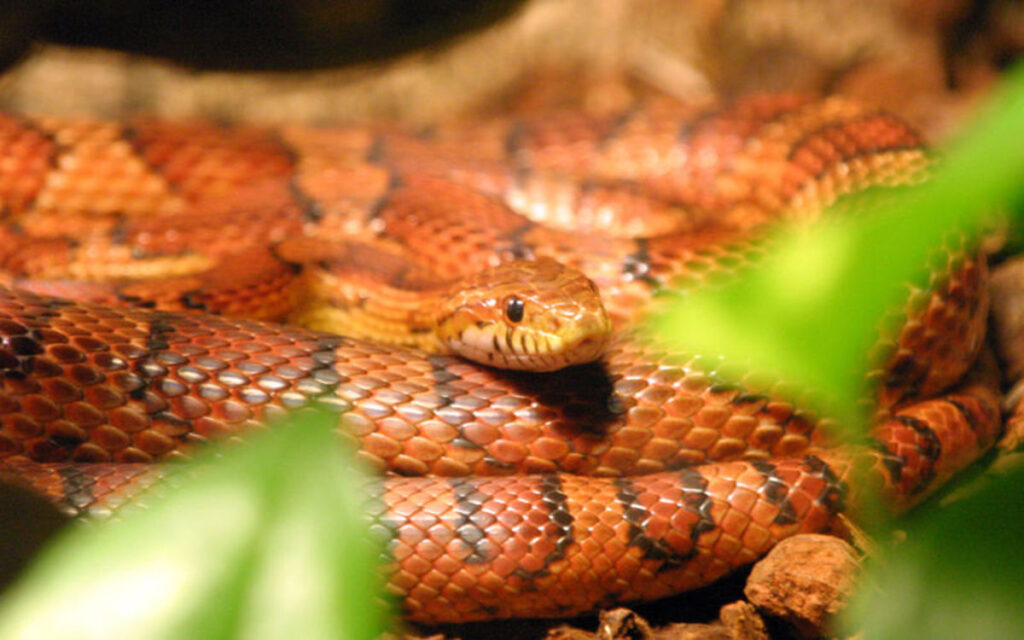Although many people still know that corn snakes are not poisonous snakes to humans. However, some questions surrounding whether corn snakes are toxic to dogs or cats remain unanswered. Articles Are Corn Snakes Poisonous To Dogs? will answer this question for you.
The truth about the venom of the corn snake
North American corn snakes, commonly referred to as red rat snakes, are nonvenomous snakes. They are not thought to be hazardous to people since they do not generate venom.
Due to their gentle temperament and simplicity of maintenance, they are frequently kept as pets. The majority of their victims are tiny rodents like mice and rats, which they kill through constriction.
Structure of teeth and venom of corn snakes
Nonvenomous snakes of the genus Elaphe include corn snakes, commonly referred to as red rat snakes. With a total of 24 to 30 teeth in the upper jaw and 21 to 28 teeth in the lower jaw, they have a snake-like dentition.

The short, pointed, curved teeth are utilized for catching and gripping prey. Since they lack venom, they must kill their victim by constriction. This is the next information in Are Corn Snakes Poisonous To Dogs?
Is corn snake venom dangerous to dogs?
Corn snakes are nonvenomous, which means they lack venom and cannot produce venom. In terms of venom toxicity, they are thus not harmful to dogs or other animals. However, a corn snake, like any snake, could attack a dog if it senses danger or is treated roughly.
Although these bites might result in tiny puncture wounds or abrasions, they are not poisonous and normally do not endanger the dogs’ health. However, if your dog has been bitten by any snake, it’s advisable to get veterinary care as there may be a danger of infection.
What would happen if a corn snake bit the dog?
A corn snake’s bite on a dog would probably result in small puncture wounds or abrasions but wouldn’t be poisonous. Since they lack the capacity to inject venom into either their food or predators, corn snakes are not poisonous.
The bite itself probably won’t hurt very much, but the region around it could swell and get red. The dog might also feel a little itchy or in some little pain. It’s crucial to keep an eye out for illness symptoms in your dog even if the snake isn’t poisonous.
Increased redness, swelling, warmth, or discharge from the bite area are common signs of infection. Your dog may also get feverish or be more sluggish than normal.
Call your veterinarian as soon as you become aware of any of these signs. They will be able to clean the wound and, if an infection is present, may prescribe medications. This is the next information in Are Corn Snakes Poisonous To Dogs?
Can we raise corn snakes with dogs?
It is feasible to grow corn snakes with canines, but doing so does call for additional care and safety measures to protect both the snake and the dog. First and foremost, it’s crucial to acclimate your dog to the snake’s presence and educate them to respect its territory rather than regard it as prey.
This may be achieved by gradually exposing the dog to the snake while keeping an eye on them and rewarding them for being calm around the snake. Having a safe container for the snake that the dog cannot get is also crucial.
This might be a terrarium or a cage made especially for snakes. Even if they have been socialized with the snake, dogs should never be left alone with it due to the possibility of accidents.
Even though corn snakes are non-venomous, it’s crucial to keep in mind that they can still bite if they feel threatened or if they are treated violently. As a result, it’s crucial to educate your dog appropriate behavior near snakes and to always keep an eye on their interactions.
In conclusion, it is possible to raise corn snakes with dogs, but it requires proper socialization, training, and enclosure setup. It’s important to always supervise interactions between the two and to take the necessary precautions to ensure the safety of both the snake and the dog.
If you are unsure or uncomfortable about the situation, it’s best to consult with a veterinarian or a snake expert. This is the next information in Are Corn Snakes Poisonous To Dogs?
Special care should be taken when raising both corn snakes and dogs
Corn snakes and dogs should both be raised with extra caution. Both animals have particular requirements that must be satisfied in order to maintain their health and welfare.
Setting up a good enclosure is essential for corn snakes. They need a safe cage with enough space for them to walk about freely and comfortably, as well as one that has a heat source and a place to bask.
They also require a place to hide, a water dish, appropriate lighting, humidity control, and temperature regulation. For dogs, good care entails feeding them a balanced food, giving them regular exercise, and taking them to the doctor on a regular basis.
In order for them to learn how to act responsibly among people and other animals, they must also be taught and socialized. Furthermore, it’s critical to give them a home that satisfies their demand for room and comfort while being safe and secure.
It’s crucial to monitor their interactions and take safety measures while growing canines and corn snakes together. This involves making sure the dog is properly socialized and trained to respect the snake’s space as well as keeping the snake’s enclosure locked up so that the dog cannot reach it.
Additionally, it’s critical to keep an eye on both animals’ health and, if required, seek veterinarian attention. Overall, it takes time, commitment, and a desire to learn about the particular requirements of each species to raise both corn snakes and dogs.
Both animals may live happily and prosper in the same home with the right care. This is the next information in Are Corn Snakes Poisonous To Dogs?
Conclusion
There are some special notes when you keep corn snakes, even if you have a dog, it is even more important to pay attention. Hope the article Are Corn Snakes Poisonous To Dogs? will provide you with useful information.




